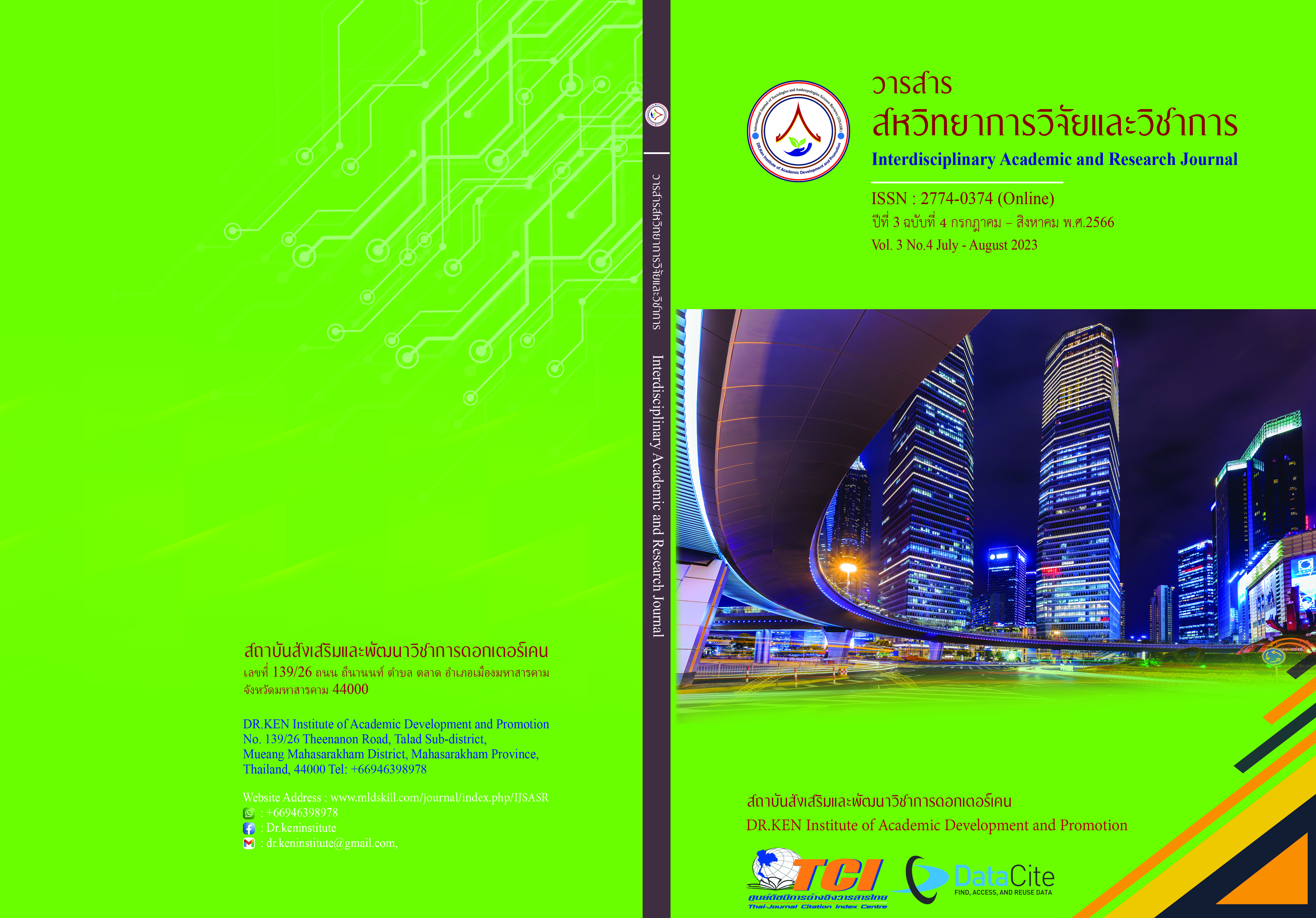Factors Influencing Convenience Stores Survival in Response to New Normal Lifestyles
DOI:
https://doi.org/10.14456/iarj.2023.212Keywords:
Transformational Leadership; , Digital Transformation;, Knowledge Management; , Organization SurvivalAbstract
Convenience stores are facing various difficulties from the current business environment, such as an increase in competition, transformation into the technology era, and shifts of consumer behavior into the new normal lifestyles as a result of the COVID-19 crisis. Therefore, convenience store businesses must seek ways to adjust themselves to survive under such hard conditions. The objective of this research was to examine the factors affecting the survival of convenience stores in response to the new normal lifestyles. The questionnaire was used as a tool in this quantitative research. The research samples were 400 convenience store employees in Bangkok which were selected by using convenience sampling. The collected data were analyzed by using frequency, percentage, mean, standard deviation, and multiple regression analysis. The results showed that the opinions of these convenience store employees on the transformational leadership factor were at a high level. On the other hand, their opinions on digital transformation, knowledge management, and survival of convenience stores in response to the new normal lifestyles were at the highest level. The results of the hypothesis testing revealed that the factors affecting the survival of convenience stores in response to the new normal lifestyles were: Transformational Leadership (β = .280), Digital Transformation (β = .408), and Knowledge Management (β = .471). Each of these three factors influenced the survival of convenience stores in response to the new normal lifestyles at the 0.01 level of statistical significance. The model had a coefficient of determination value of .717, meaning that it could explain 71.7 percent of the variability in the survival of convenience stores in response to the new normal lifestyles.
References
กมลมาลย์ ไชยศิริธัญญา. (2559). ภาวะผู้นำการเปลี่ยนแปลงของผู้บริหารที่ส่งผลต่อสมรรถนะหลักของครูในโรงเรียน สังกัดสำนักงานเขตพื้นที่การศึกษามัธยมศึกษา เขต 2. วารสารฉบับภาษาไทย สาขามนุษยศาสตร์สังคมศาสตร์และศิลปะ มหาวิทยาลัยศิลปากร, 9(2), 1515-1522.
จันทร์จิรา เหลาราช. (2565). ตัวแบบของการปรับเปลี่ยนสู่องค์กรดิจิทัล. วารสารมหาวิทยาลัยพายัพ, 32(2), 173-184.
ดนัยรัฐ ธนบดีธรรมจารี. (2562). Digital transformation and enterprise architecture. Retrieved on March 30, 2023, from: https://www.sit.kmutt.ac.th/wp-content/uploads/2019/09/001_DX_Part1_Intro_v1082_DT.pdf.
ทัศนีย์ เทียมถนอม. (2564). วิถีชีวิตใหม่กับสื่อสารการตลาดดิจิตัล. วารสารมนุษยศาสตร์และสังคมศาสตร์ มหาวิทยาลัยราชภัฏอุบลราชธานี, 13(1), 297-304.
นันธิดา จันทร์ศิริ. (2560). ภาวะผู้นำการเปลี่ยนแปลงในการบริหารการเปลี่ยนแปลงเพื่อสร้างสรรค์นวัตกรรมภายในองค์กร. วารสารศารอาศรมวัฒนธรรมวลัยลักษณ์, 17(1). 79-98.
เบญจมาส ลักษณิยานนท์. (2564). ผลกระทบของความสามารถในการปรับตัวของธุรกิจ และการจัดการความรู้ที่มีต่อผลประกอบการด้าน การเงิน: กรณีของธุรกิจขนาดกลาง และขนาดย่อมไทย. Thai Journal of Public Administration, 19(2), 97-97.
ประภัสสร ทองยินดี. (2558). แนวคิดการจัดการความรู้ (Knowledge Management). Retrieved on March 30, 2023, from: https://www.stou.ac.th/study/sumrit/2-59(500)/page3-2-59(500).html.
ภัทรานิษฐ์ ก้อนจันทร์เทศ. (2564). การเปลี่ยนแปลงทางดิจิทัล (Digital Transformation) ต่อความยั่งยืน ของธุรกิจร้านอาหาร SME : ในบริบทของการแพร่ระบาดของโรคโควิด – 19. วิทยานิพนธ์การจัดการมหาบัณฑิต, มหาวิทยาลัยมหิดล.
ยิริน จาง และวสันต์ กันอ่ำ. (2562). ปัจจัยที่ส่งผลต่อการเลือกซื้อสินค้าออนไลน์ของลูกค้าชาวไทย.Humanities and Social Science Research Promotion Network Journal, 3(2), 16-28.
วายุ จินดาพล. (2563). รายงานวิจัยผลกระทบของพฤติกรรมผู้บริโภคในยุคดิจิทลัต่อการแก้ไขปัญหาเรื่องร้องทุกข์ปี 2563. กลุ่มพัฒนาระบบบริหาร สำนักงานคณะกรรมการคุ้มครองผู้บริโภค.
วีระพงศ์ เกียรติไพรยศ และคณะ. (2560). ภาวะผู้นำกับการบริหารองค์การในยุคนิวนอร์มัล. วารสารพุทธสังคมวิทยาปริทรรศน์, 7(1), 123-134.
ศรัณย์ จีรังสุวรรณ. (2560). ปัจจัยที่มีผลต่อการตัดสินใจเลือกใฃ้บริการร้านสะดวกซื้อของผู้บริโภคต่อผู้ประกอบการในเขตพื้นที่กรุงเทพมหานครและปริมณฑล. วิทยานิพนธ์ปริญญามหาบัณฑิต, มหาวิทยาลัยมหิดล.
ศิริรักษ์ บุญพร้อมรักษา และคณะ. (2564). บทบาทผู้นำยุคใหม่ที่มีผลต่อการจัดการองค์การบนฐานวิถีชีวิตใหม่. วารสารวิทยาการจัดการปริทัศน์, 23(2), 257-266.
ศิวะนันท์ ศิวพิทักษ์. (2557). กระบวนการจัดการความรู้ และนวัตกรรมส่งผลต่อการอยู่รอดขององค์กรธุรกิจ. Suthiparithat, 28(85), 45-60.
เศรษฐพงค์ มะลิสุวรรณ. (2560). การเปลี่ยนผ่านทางดิจิทัลของประเทศไทย เพื่อนำไปสู่ Thailand 4.0. วารสารวิชาการ กสทช ประจำปี 2561. Retrieved from: https://so04.tci-thaijo.org/index.php/NBTC_Journal/article/view/161419/116413
สถาพร พฤฑฒิกุล. (2563). ปัจจัยที่ส่งผลต่อภาวะผู้นำการเปลี่ยนแปลงของนิสิต คณะศึกษาศาสตร์ มหาวิทยาลัยบูรพา. วารสารศึกษาศาสตร์ มหาวิทยาลัยบูรพา, 31(2), 43-54.
สัจจวัฒน์ จารึกศิลป์. (2564). การดำเนินธุรกิจผู้ประกอบการด้านกีฬาในยุคการเปลี่ยนแปลงทางเทคโนโลยีดิจิทัลอย่างพลิกผัน. วารสารสหศาสตร์, 21(1), 1-13.
Bass, B. M., & Avolio, B. J. (1994). Transformational leadership and organizational culture. The International Journal of Public Administration, 17(3-4), 541-554.
Bass, B. M., & Riggio, R. E. (2006). Transformational leadership. Mahwah, NJ: Erlbaum.
Cochran, W. G. (1977). Sampling Techniques. New Jersey: John Wiley & Sons.
Dessler, A. E. (1998). A reexamination of the “stratospheric fountain” hypothesis. Geophysical Research Letters, 25(22), 4165-4168.
Nonaka, I., & Takeuchi, K. (1995). The Knowledge-Creating Company. New York, NY: Oxford University Press.
Reade, C., & Lee, H. J. (2016). Does ethnic conflict impede or enable employee innovation behavior? The alchemic role of collaborative conflict management. LSE Research Online Documents on Economics 65613, London School of Economics and Political Science, LSE Library. https://ideas.repec.org/p/ehl/lserod/65613.html
Downloads
Published
How to Cite
Issue
Section
License
Copyright (c) 2023 Kullatada Sodsup, Somchawee Sirisopana

This work is licensed under a Creative Commons Attribution-NonCommercial-NoDerivatives 4.0 International License.
Copyright on any article in the Interdisciplinary Academic and Research Journal is retained by the author(s) under the under the Creative Commons Attribution-NonCommercial-NoDerivatives 4.0 International License. Permission to use text, content, images, etc. of publication. Any user to read, download, copy, distribute, print, search, or link to the full texts of articles, crawl them for indexing, pass them as data to software, or use them for any other lawful purpose. But do not use it for commercial use or with the intent to benefit any business.
















.png)


